
Paul Babinski
@paulbabinski.bsky.social
Department of Religion, UGA
Recent publications
On the study of looted Qur'ans (with Jan Loop): https://brill.com/view/journals/erl/9/3/article-p239_001.xml
On manuscript catalogs: https://www.academia.edu/125336554/The_Manuscript_Catalog_proofs
Recent publications
On the study of looted Qur'ans (with Jan Loop): https://brill.com/view/journals/erl/9/3/article-p239_001.xml
On manuscript catalogs: https://www.academia.edu/125336554/The_Manuscript_Catalog_proofs
Indeed, Leemann doesn't line up chronologically. Maybe the notes are earlier, and in a different hand (though the handwriting is similar). Perhaps recorded from annotations in another copy? Always possible there's a textual source but can't find it and there are no page numbers.
November 6, 2025 at 3:30 AM
Indeed, Leemann doesn't line up chronologically. Maybe the notes are earlier, and in a different hand (though the handwriting is similar). Perhaps recorded from annotations in another copy? Always possible there's a textual source but can't find it and there are no page numbers.
Here’s the link for the talk, “The Royal Danish Library: A Case Study in the History of European Islamic Manuscript Collections”, 25 April, 12:00 PM EDT: www.library.upenn.edu/events/royal...
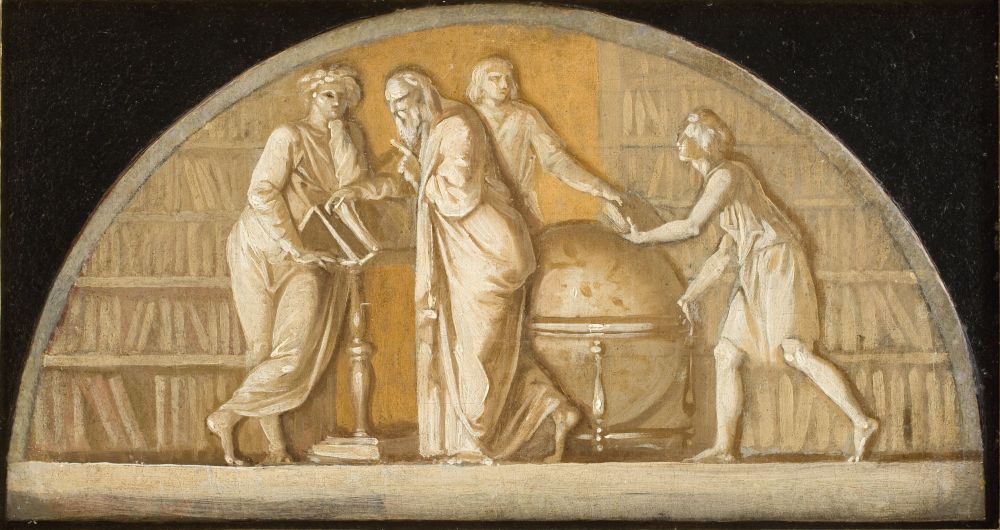
The Royal Danish Library: A Case Study in the History of European Islamic Manuscript Collections
Paul Babinski examines the provenance of Islamic manuscripts held in the Royal Library in Copenhagen, tracing the genesis of the collection and its historical contexts from the library’s founding in t...
www.library.upenn.edu
April 22, 2025 at 4:37 PM
Here’s the link for the talk, “The Royal Danish Library: A Case Study in the History of European Islamic Manuscript Collections”, 25 April, 12:00 PM EDT: www.library.upenn.edu/events/royal...
For instance, one our more exciting discoveries in Copenhagen: this 1633 printing in Arabic of the Poem on the Soul attributed to Ibn Sīnā, which was bound into the Dutch orientalist Jacob Golius’s interleaved & annotated copy of his Proverbia quaedam Alis. CKB, ms Or.Arch. 1-8
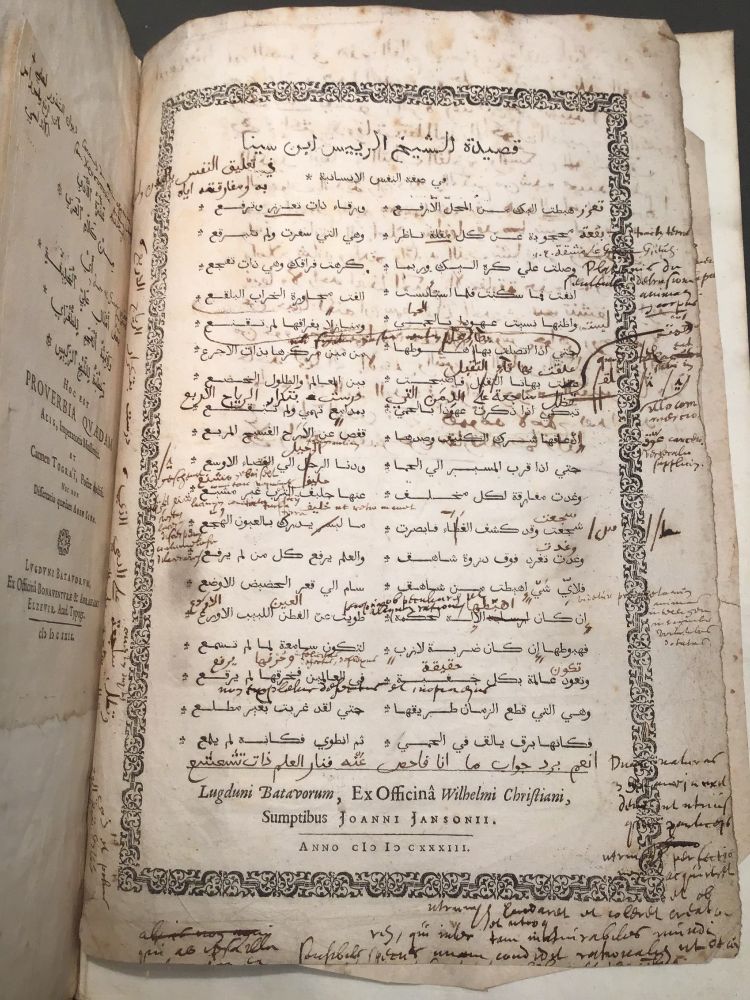
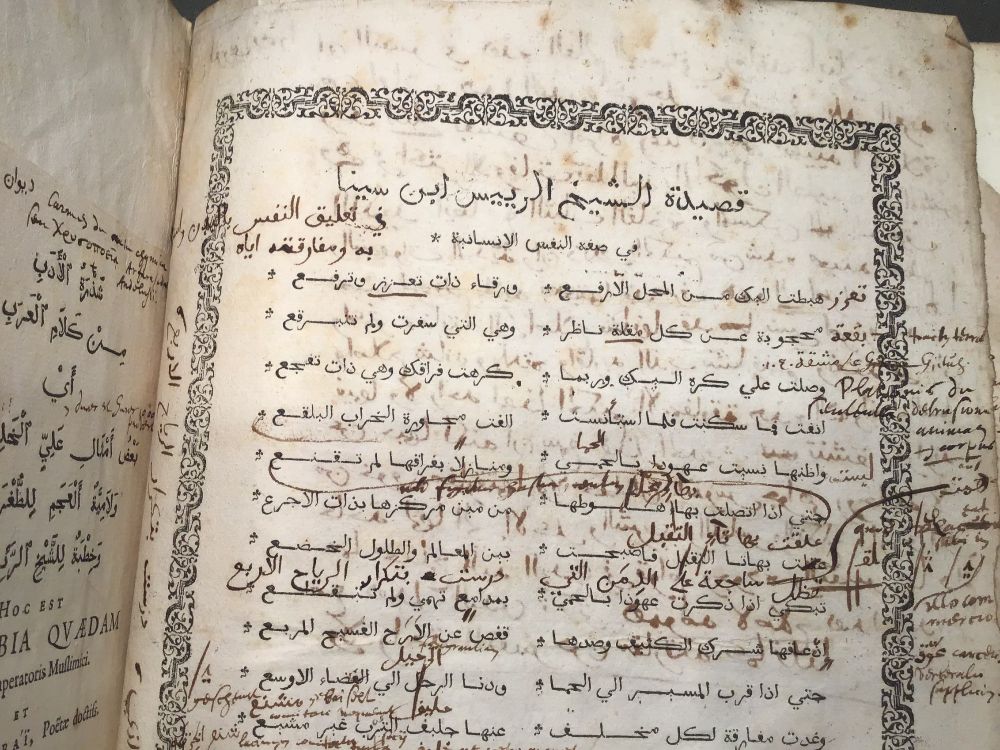
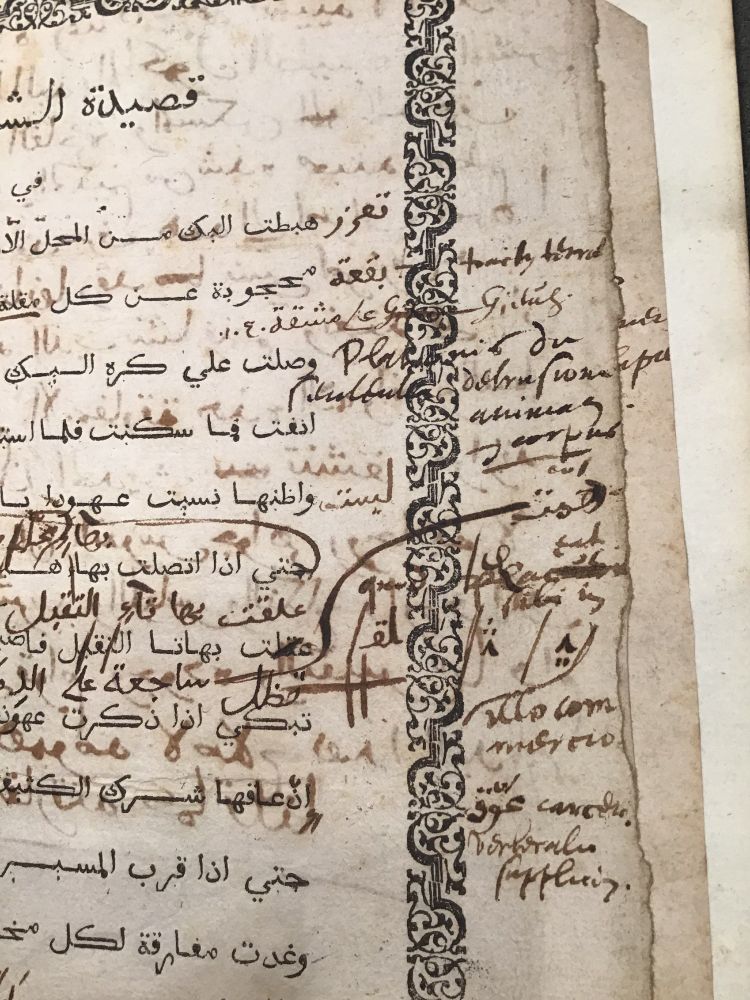
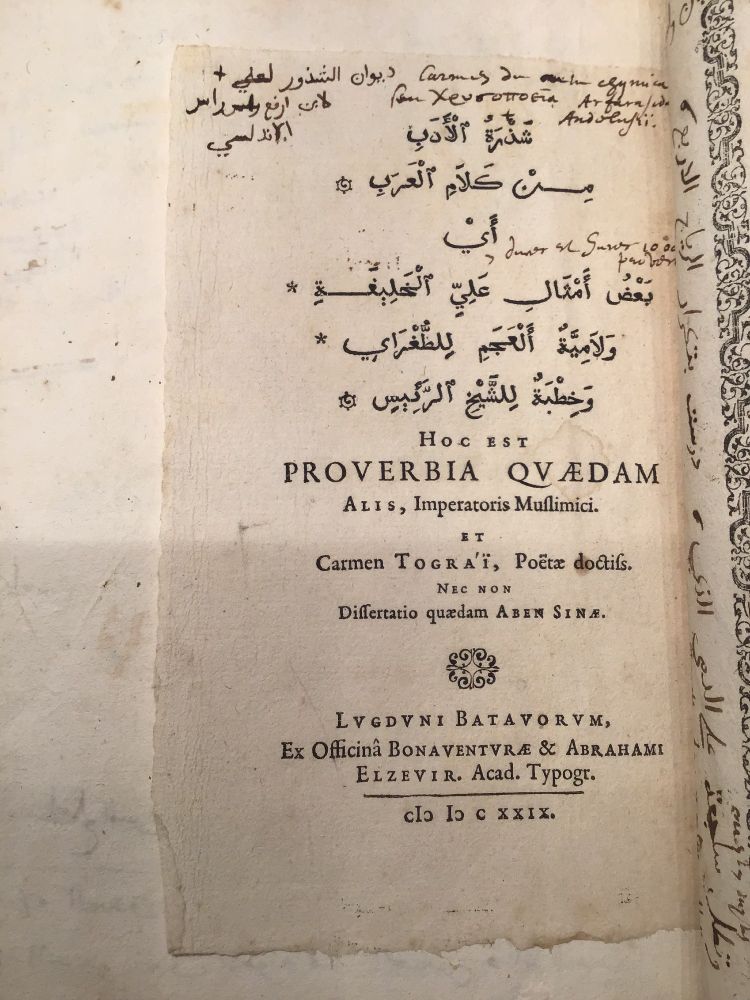
April 22, 2025 at 4:37 PM
For instance, one our more exciting discoveries in Copenhagen: this 1633 printing in Arabic of the Poem on the Soul attributed to Ibn Sīnā, which was bound into the Dutch orientalist Jacob Golius’s interleaved & annotated copy of his Proverbia quaedam Alis. CKB, ms Or.Arch. 1-8
That sounds promising. Thank you!
March 1, 2025 at 5:26 PM
That sounds promising. Thank you!
If you’re around, please join! Also, food recommendations for Bologna or Milan are especially welcome. centri.unibo.it/memorylab/en...
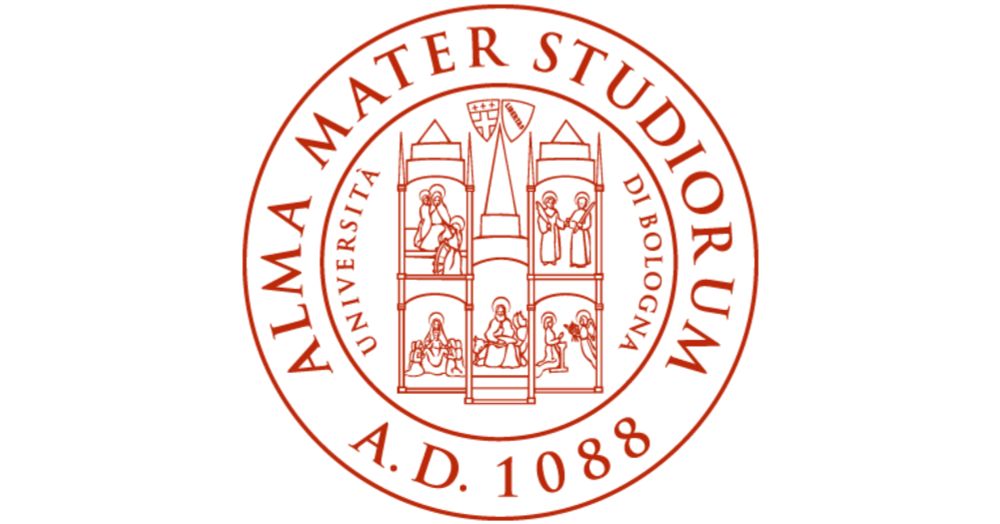
Collecting Islamic Manuscripts in Early Modern Europe: The Marsili Collection in Context
First meeting of the seminar series ‘At the Intersection of Multiple Memories. Collecting Manuscripts in Early Modern Europe and the Ottoman Empire: The Marsili Case’.
centri.unibo.it
March 1, 2025 at 4:58 PM
If you’re around, please join! Also, food recommendations for Bologna or Milan are especially welcome. centri.unibo.it/memorylab/en...
Olearius’s notebook is today (with a number of other Olearius manuscripts) in the Berlin State Library and was recently digitized: resolver.staatsbibliothek-berlin.de/SBB0002F6C50...
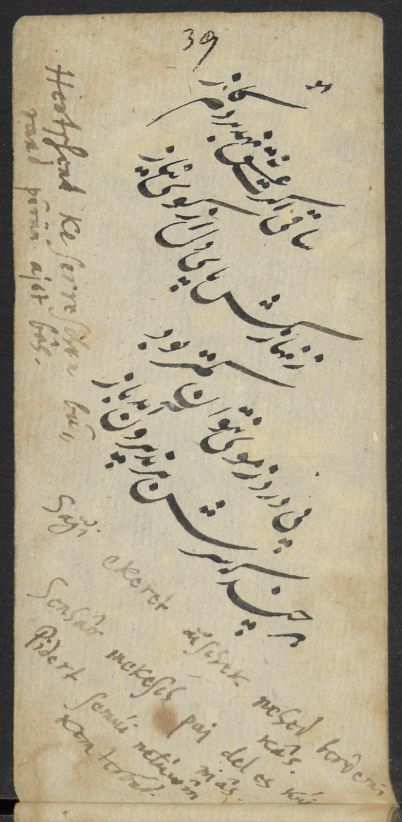
January 9, 2025 at 8:12 PM
Olearius’s notebook is today (with a number of other Olearius manuscripts) in the Berlin State Library and was recently digitized: resolver.staatsbibliothek-berlin.de/SBB0002F6C50...
Robyn's done incredible work on the subject and has managed to track down a bunch of these Istanbul albums. Fascinating manuscript. Thanks for sharing!
January 6, 2025 at 4:58 PM
Robyn's done incredible work on the subject and has managed to track down a bunch of these Istanbul albums. Fascinating manuscript. Thanks for sharing!
January 6, 2025 at 4:25 PM
I think this misrepresents Marchand's criticism of Said, and I certainly wouldn't call her account of nineteenth-century oriental studies de-politicized.
January 6, 2025 at 3:52 PM
I think this misrepresents Marchand's criticism of Said, and I certainly wouldn't call her account of nineteenth-century oriental studies de-politicized.
This isn't necessarily bad. It can be a transformative experience to read Kafka with an expert teacher and reader. That person doesn't need to be much of a researcher. But it's pseudo-scientific to not distinguish that from, say, the work of identifying and editing Kafka's manuscripts.
December 29, 2024 at 5:14 PM
This isn't necessarily bad. It can be a transformative experience to read Kafka with an expert teacher and reader. That person doesn't need to be much of a researcher. But it's pseudo-scientific to not distinguish that from, say, the work of identifying and editing Kafka's manuscripts.
Well, not frowned on if we're using the "everything professors write and think" standard. Some subfields (medieval, early modern) can be more research heavy, but that's not where the hiring is these days. "Research is what you do with your friends in your free time" one senior scholar told me.
December 29, 2024 at 5:02 PM
Well, not frowned on if we're using the "everything professors write and think" standard. Some subfields (medieval, early modern) can be more research heavy, but that's not where the hiring is these days. "Research is what you do with your friends in your free time" one senior scholar told me.
In lit fields, research is generally frowned upon (how many get a TT job on the basis of a great edition?). But the vocabulary of "research" sounds good when you're asking for extra funding, sabbatical, etc.
December 29, 2024 at 4:35 PM
In lit fields, research is generally frowned upon (how many get a TT job on the basis of a great edition?). But the vocabulary of "research" sounds good when you're asking for extra funding, sabbatical, etc.
Yes, though I don't think all (or even most) humanities work is research. There are real deficiencies in US humanities research, but that's in no small part due to the priorities of professors, hiring committees, admin.
December 29, 2024 at 4:21 PM
Yes, though I don't think all (or even most) humanities work is research. There are real deficiencies in US humanities research, but that's in no small part due to the priorities of professors, hiring committees, admin.
I don't know, I think using the word "research" to mean "everything university professors in the humanities think and write" is pseudo-scientific and fetishizing, and obscures clear analysis of the research question (I mean, do libraries and museums play any role in this story??)
December 29, 2024 at 4:11 PM
I don't know, I think using the word "research" to mean "everything university professors in the humanities think and write" is pseudo-scientific and fetishizing, and obscures clear analysis of the research question (I mean, do libraries and museums play any role in this story??)

